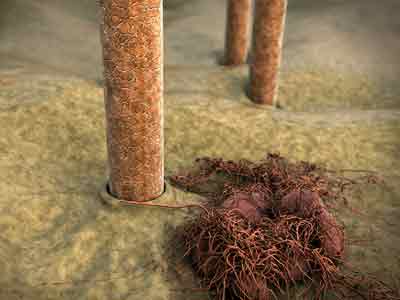 Scalp folliculitis, or hair folliculitis, is common among both men and women. This condition is characterized by moderate to severe irritation of the hair follicle(s), which may disrupt normal hair growth when left untreated.
Scalp folliculitis, or hair folliculitis, is common among both men and women. This condition is characterized by moderate to severe irritation of the hair follicle(s), which may disrupt normal hair growth when left untreated.
Know the symptoms. If the irritated area of skin exhibits red pimples that appear to have a hair growing from the center, you may have hair folliculitis. This condition is easily recognized on the arms, back, legs, and beard/neck area. It is not so easily recognized when it occurs on the scalp, making it important to consult a hair loss professional should you notice pimples, itchiness, burning sensations, or discharge along the hairline, crown of the head, or rear/sides of the scalp.
Use the information below to learn more about hair folliculitis, scalp irritation, and hair loss. If you believe hair folliculitis might be causing you hair to thin, recede, or bald, schedule a hair loss evaluation to learn more about effective treatment with world renowned experts at the Hair Transplant Institute of Miami.
What causes hair folliculitis?
Hair folliculitis is most commonly caused by the following:
- Yeast
- Fungus
- Bacteria
- Contact/rubbing from tight clothing
- Damaged hair follicles (e.g. shaving irritation)
- Blockage caused by irritants like sweat, oils, and cosmetic makeup
Can folliculitis lead to hair loss?
At first, the follicle may maintain its hair fiber while folliculitis begins to take effect. In time, irritation may make it impossible for the hair follicle to support a normal hair growth cycle. When pronounced, folliculitis can cause irritation so severe that it damages the hair follicle entirely, rendering it incapable of producing any hair at all.
Treat and Reverse Hair Folliculitis
There are a few effective ways to treat and reverse hair folliculitis.
- Get a hair loss diagnosis. Because hair folliculitis can be difficult to identify, it’s important to consult a hair loss professional should you notice any of the symptoms described above.
- Treat the folliculitis. Sometimes, folliculitis is caused by a bacterial infection that can be treated with an over-the-counter antibiotic ointment. In other cases, non-infectious hair folliculitis can be treated by thoroughly cleaning excess sebum from the scalp. When treating folliculitis, it’s important to follow the recommendation given by your hair loss professional.
- Regain what’s lost. Finally, consider additional hair loss treatments to prevent additional hair loss while also thickening your hair. Topical foam, prescription medication, and low-level laser therapy are among the most common forms of treatment. More information on each of these hair loss treatments is provided below.
Topical Hair Loss Foam
Everyone has seen a commercial for Rogaine®. As one of the most popular topical hair loss foams, Rogaine is widely recognized by men, women, and hair loss professionals as a viable option for slowing and stopping the progression of hair loss. Visit the following page to learn more about hair loss treatments like Rogaine.
Prescription Hair Loss Medication
One of the most common prescription medications for hair loss is finasteride, better known as Propecia®. This drug is available only for men, and women must be careful not to handle these tablets, especially while pregnant or nursing. If you are a man suffering with hair loss, visit the following page to learn more about prescription medicines like Propecia.
Laser Hair Restoration
Laser Hair Restoration (LHT) is enjoying a lot of recent popularity among men, women, and physicians. This is a minimally invasive, nonsurgical hair restoration option that involves laser treatment up to 3-4 times weekly. Patients may visit our office to receive laser therapy, or they may purchase a personal-use hair restoration laser like the Capillus272™ Pro for use at home.
Folliculitis Diagnosis and Treatment in Miami
If you believe hair folliculitis might be causing you hair to thin, recede, or bald, schedule a hair loss evaluation to learn more about effective treatment with world renowned experts at the Hair Transplant Institute of Miami. Our surgeons, nurses, and staff represent the finest team in Miami. To learn more about treatment, contact our clinic at 305-925-0222.

